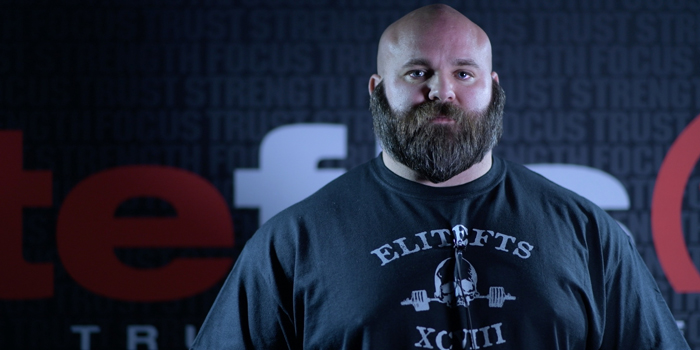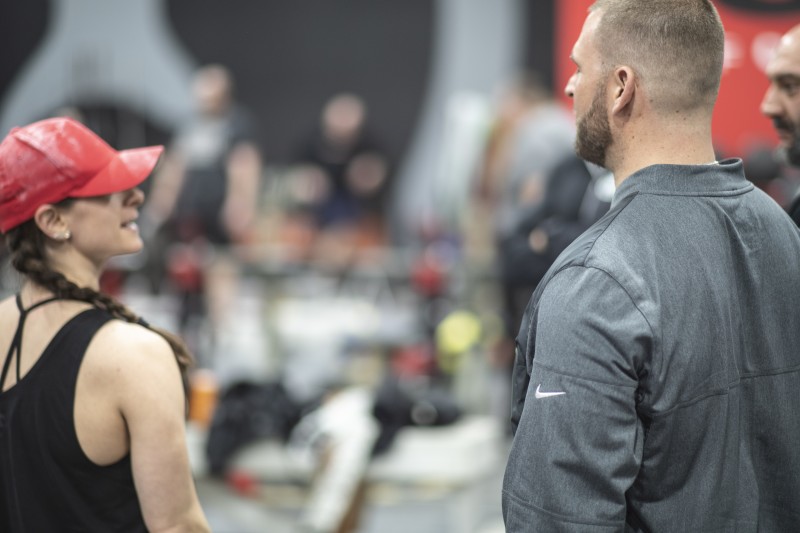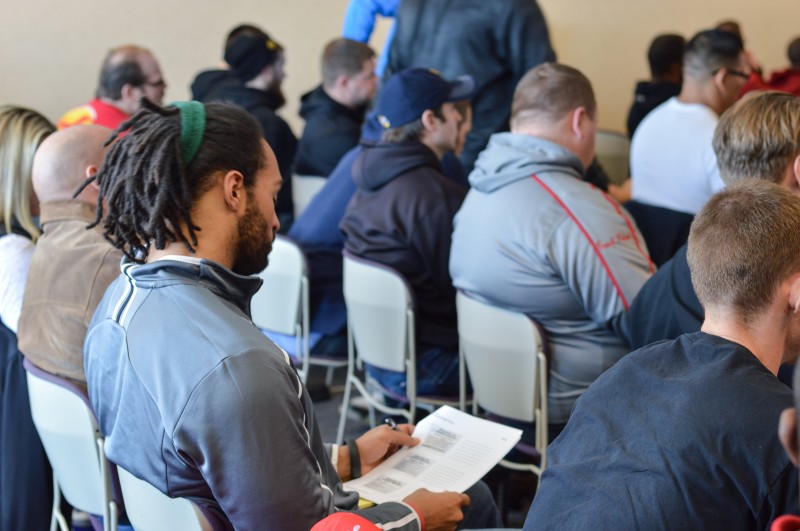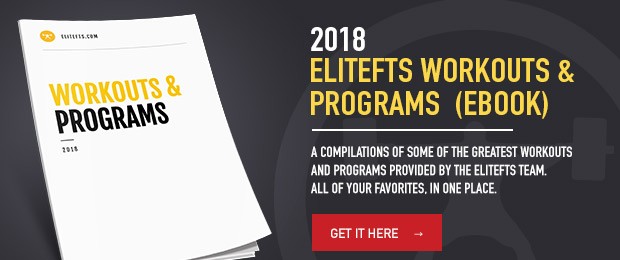
To some, the job of collegiate strength and conditioning coach sounds awesome. “Man, I get to live in a weight room, make athletes bigger and stronger, and someone is going to pay me to do this? Perfect!” Yeah, it sounds like fun and games, but even if you really love it, it still isn’t. It’s a job like any other. And just like most jobs, it’s not what you know; it’s who you know. Within this world, that statement is 100% true. I’m going to lay out in this article the path you should take to get one of these jobs. It’s simple but not easy, so swallow your pride and ego before you move forward.
Starting Early
If you have the means and the opportunity, you can get your start in high school. The start I’m speaking of is to see if you can “hire” your local collegiate strength and conditioning coach to do private strength sessions with you for your high school sports program. Just getting to know a collegiate strength coach (if you are in a location that has one), is a good way to get “in” already. Maybe they are not willing to train you, but you can always meet them and pick their brain about training if they are willing.
RECENT: Jeremy Frey: A Reintroduction
Now, don’t be a jackass and write some horrible, short email that says, “Hey, [coach’s name]. My name is [your name] and I wanted to know if you could train me. Thanks.” You wouldn’t believe how many emails I have gotten that look just like this. Seriously, take a writing class or have your English teacher or parents help you out. Hell, I’ve had parents write crap like this, so please, put some effort into it. Give them your name, your number, tell them where you are from, and explain why you are contacting them. Be personable, ask nicely, and see if they would be willing to meet with you at their convenience. You should know that they might not get back you, ever. But you have a heck of a better shot at getting a reply if you articulate your interests coherently. I usually do not see high school kids wanting to be an intern, but if you are senior and are interested, ask. The worst thing that happens is they say no.
Collegiate Internships
If you are a student-athlete attending a college or university that has a strength and conditioning department, you will already have an “in” getting to know the strength staff. This will make acquiring an internship much easier, which will help open some doors. If you’re a non-athlete attending the university, you had better be in the kinesiology department program and hopefully have some background in athletics and training. If not, don’t even bother.
As an intern, expect the following:
- Be ready to wake up early, like 5 AM. We have a ton of early morning groups and you will be expected to be there. If you are not a morning person or don’t want to be, don’t bother.
- As collegiate strength coaches, we are already at the bottom of the totem pole (I will cover this more in the next article). You are interning for us, so what do you think that makes you? Be prepared to do anything and everything.
- You will not be running groups (initially, or maybe never). Your sole purpose is to do the jobs the strength staff doesn’t want to do (even though we still have to, especially when we don’t have interns). We all started here and so will you. Lose the pride and ego.
I’m not going to write more expectations because every coach is different, but simply show up on time and when you are supposed to, be willing to do what you are told, and don’t get too big for your britches. Interns are a dime a dozen.
As an intern, do the following:
- Show up 10 minutes before the coach. Who cares if you are standing outside forever? Dress warmly. If you are early, you are on time. If you are on time, you are late.
- Bust your ass. If stuff needs set up, get it done. If the floor needs mopped and benches need cleaned, do it before you are asked to.
- Keep your mouth shut and your ears and eyes open. Pay attention to the coaching cues and how the staff stands and moves. Listen to the cues and see how they apply to the movement. Listen to how the coaches interact with the student-athletes.
- Keep a pen, stopwatch, whistle, and little notepad on you at all times. Maybe you will never use the watch or whistle, but the coach might need a watch or have you blow the whistle when needing to get the attention of someone. The notepad is so that you can write down questions to ask the coach after the training session has concluded. Also, if you need to remember what an athlete told you or if you need to make an adjustment to a program later then you have that information, so this plays into your job later down the road of keeping track of information.
- Don’t have sex or a relationship with the student-athletes! Jesus, you are a coach now. They are off limits. I don’t care if you knew them before or if you are the same age or did the deed with them prior. That shit is all over. You are a coach; start acting like one, day one (this will be covered more in a later article). Understand that if you are afforded the opportunity to intern with anyone, you now represent that department and university. It doesn’t look as bad on you as it will to the department, university, and public.
- Stick around, talk shop, and pick brains. Ask why things are done a certain way. Anyone who asks me why I do what I do receives an answer. You will learn more doing this than doing anything else. The weight room has now started to take over your life if it hadn’t already. Embrace it.
- Don’t be a stick figure. Be strong. I’m not saying you have to squat 650 and bench 405, but you better look the part (bald head and beard not required but not looked down upon either). If you look like a stiff breeze will blow you over, it doesn’t mean you are not smart, but it won’t win you any respect from your athletes. Athletes want to get strong and will follow those who are strong. I’ve had more than one intern show up wanting an opportunity, looking like they’ve spent most of their gym time hanging out in the corner where they keep the Cybex equipment, doing Jane Fonda workouts, listening to trap rap on their Bluetooth earbuds. If you want an internship that involves mixing shakes, setting up equipment, cleaning the weight room, and never talking for a semester (and then I never hear from you again), you’re signed up. If you have career aspirations, find a squat bar and go from there. And stop wearing those joggers, “bro.” Nowadays it’s tight joggers, wearing backward hats like they did in the early 90s, and beards that resemble pubic hair. All of this on frames that look like a frog stood up and put pants on. Visualize that. Try and look like a man, for the love of God. But I digress.
There are more points but the important thing is to just do what you are told and be enthusiastic about it.
Education
To coach in the collegiate world, you would benefit from an undergraduate degree in some sort of exercise science field. It isn’t mandatory that it be exercise science, but if you want to move onto a master’s program in the kinesiology field, that would be advantageous. A master’s on most postings for jobs is not a necessity but is usually preferred. If you have a master’s degree it means to most that you probably have more experience in the field of performance, both in the classroom and in the field — especially if you were a graduate assistant for the strength department at your university.
I will say this now and it’s the damn truth: you will not learn in the classroom what you need to know in the weight room or for athletic performance. All the garbage that is taught is just that: garbage, and a lot of useless knowledge. Pay attention to physiology and testing protocols for body fat and VO2, but other than that, you need to be in a weight room. That is where being a graduate assistant comes into play.
RELATED: The Qualities I Look for in a Strength and Conditioning Intern or Colleague
You will also need to obtain a certification during your undergraduate years, or at least when you graduate. Plan for either Certified Strength and Conditioning Specialist (CSCS) from the National Strength and Conditioning Association (NSCA) or Strength and Conditioning Coach Certified (SCCC) from the Collegiate Strength and Conditioning Coaches Association (CSCCa). You will also need to be CPR and AED certified. If you don’t have this, you don’t move on.
Graduate Assistantships
If you really want to move on into the field of collegiate strength and conditioning then you will want to apply for and receive a graduate assistantship. Not only will this pay for your master’s degree and supply you with a stipend (that will still leave you in poverty), but you will also get two years of experience coaching student-athletes and building your resume. This is where you will start to see how a strength coach fits into the athletic department and the student-athlete world.
You will learn how to coach, teach movements, apply programming, deal with some of the politics, schedule multiple teams, work the weight room flow to your athlete’s advantage, etc. This is where you will learn that your undergraduate education was a waste and that you really know nothing at all. Depending on where you spend this time, the knowledge you gain here will be invaluable but still not even close to what you will need to know. That knowledge takes years, and you really never stop learning.
Conferences
These are a load of fun. Really. Conferences are for continuing education units( CEUs), networking with other coaches and vendors (this helps with jobs), and picking up one or two little tidbits of useful knowledge here and there. Some of the best informative conference and summits I have been the ones elitefts and Dave Tate have put on. And I’m being serious — I’m not just saying that. If you want to really learn something then you need to attend the summits elitefts puts on. You will learn more in one to two days at these seminars than at any other conference. And yes, they can count towards CEUs. You should also know that it's not what you learn from the speeches that matter; it’s what takes place between them and around a table. Picking the brains of some of the best coaches out there is where you learn how to coach and program. It really does take years of experience. Learn from those who have done it and are still doing it.
At the end of the day, you need to get a college education (a really expensive piece of paper), get in the weight room, volunteer all the time, and get to know as many coaches as you can. Learn to have no life and then you will be ready to go. Make sure you also maintain a 3.0 GPA along the way. You will need it for your master’s program and graduate assistantship, so don’t mess around and skip class. The next step is to get a job and keep learning, but this is where you must begin.













Male or Female I hope anyone that goes into this field has a brain so maybe don't make this about sexism and our profession. I've known many females and males that don't have a lot of intelligence who get into this profession.
Growing a beard isn't not a precursor to getting this job either. I'm making fun of how a lot of male strength coaches seem to look all the same; bald and facial hair.
Look like a "man" is not what I said. You should look the part. I would hope that anyone who goes into this profession looks the part, decently fit like they actually practice what they preach. IF you are a male, then being a bigger individual that looks strong and or is strong "Helps". It's no the end all be all, just can help.
I know for a fact that individuals standing at 6ft or taller, meeting eye to eye or is taller than the athletes you train will automatically get more respect then the 5' 8" individual like myself. Do I like that fact, no. But it's the truth.
"You have received better advice", great! I hope that you have. I never said my advice was the best out there. But my advice does hit on truths and barriers that are associated with our profession. NOT an end all be all. I know many amazing female strength coaches as well as men. I know many shitty female strength coaches as well as men.
Everything I said will help anyone to get a job. I am a male, so maybe I threw in things that I never knew would make a difference but they did for me without me even trying. I write what I relate to.
What applies to both genders; work your ass off, do the shitty jobs, keep your ears open and learn. Definitely don't walk around with a chip on your shoulder. That will just hold you back regardless of gender.
Thank you for your comment. It reinforces to me what I already know to be true. People only see what they want to see.